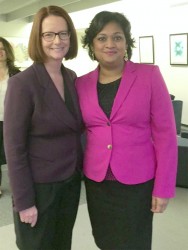The Global Partnership for Education (GPE) has approved a US$1.7M ($340M) grant for Guyana which will be used for early childhood education in the hinterland.
This was disclosed yesterday in a release from the Ministry of Education. It said that at the last meeting of the Board of Directors of the GPE from December 15-17 in Washington, DC, United States the approval was granted.
Minister of Education, Priya Manickchand sits as a Director on the board, representing Latin America and the Caribbean (Guyana, Haiti, Honduras, Nicaragua).

The release said that the Ministry of Education will apply the US$1.7 million education grant to improve its Early Childhood Education Programme with particular attention being paid to the hinterland and riverain communities. Manickchand said that she expects the grant to allow for the building upon the many gains already made and expects to see vastly improved learning outcomes in literacy and numeracy at the early levels.
Alice Albright, Chief Executive Officer of the Global Partnership for Education said, according to the press release, “If we want to reach the Education for All goals, we need to ensure that adequate funding is available from both domestic and external sources”.
“While donor funding to education has dropped by 10 percent since 2010, the Global Partnership has consistently increased its education funding, particularly for children living in the poorest and often fragile and conflict-affected countries”, she added.
The six new grants build on prior achievements and will help implement the national education plans of Central African Republic, Guinea, Guyana, Kenya, Lao PDR and Nigeria.
Guyana joined the Global Partnership for Education in 2002.
The new financing, the release said, reflects the Global Partnership’s top priorities: increasing access to basic education in fragile countries, improving the quality of education, improving teachers’ effectiveness, generating measurable results and championing girls’ education.
The Global Partnership for Education is made up of nearly 60 developing country governments, as well as donor governments and civil society/non-governmental organizations.





